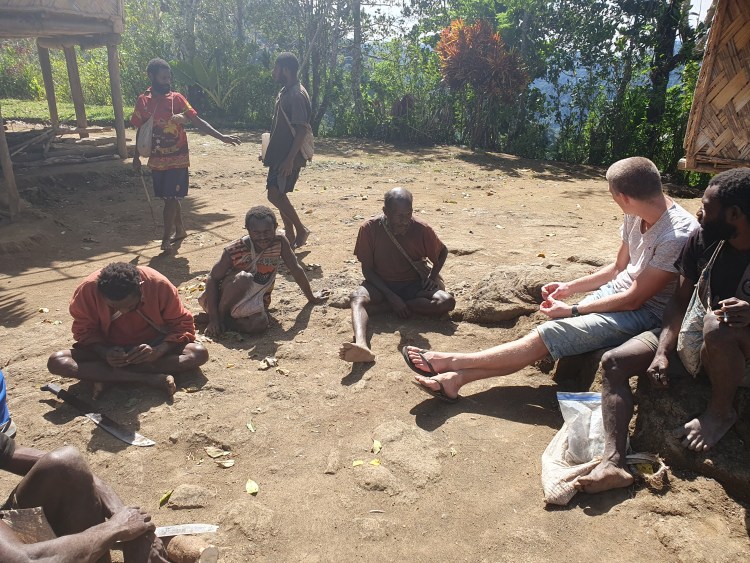Tomorrow we’ll be jumping on a helicopter to fly to Goroka for an ALW (advanced linguistics workshop) for 2 weeks. During ALW we’ll spend mornings in classes learning about different aspects of how discourse (paragraphs) is built up. Afternoons will then be spent looking for some particular aspect in Kovol texts we’ve elicited.
To be ready for this we needed to gather 13 two-to-three-minute-long recordings of Kovol speech in different genres, which we’ve transcribed to use for the ALW. Since we’re going to be digging deep into these texts, the transcription needs to be spot-on and I’ve been preparing by making sure all my texts are triple-checked, playing each one sentence by sentence and checking I’ve written it correctly.

Triple-checking something is a recipe for really making sure it’s accurate, right? At the end of this process, though, I’m not sure I’ve really nailed it, so the checking process will continue! Why’s that?

- We’re still working on confirming spelling for Kovol words. It’s very easy to have a text which is 100% spell-checked flagged as containing spelling errors because our dictionary is changing underneath us as we work!
- The Kovol language has multiple dialects. The speakers of our texts are chosen from a single dialect, but speakers can say certain words completely from the other dialect, or just be influenced by it in word choice and pronunciation.
- Some of our texts contain Tok Pisin words and checkers we’re working with often want to correct those words with equivalent Kovol words – but checkers don’t agree on what word to use!
- Speakers may make mistakes or unnecessarily repeat themselves and checkers don’t agree on corrections for that.
- If we’re tripping over a certain phrase, checkers ‘helpfully’ suggest easier alternatives and it can be difficult to focus on what was actually said.
- Speakers um and ahh (or the Kovol equivalent), but since our understanding of Kovol is still incomplete we can’t reliably identify what’s important and what’s an um or ahh.
- Sentences we want to check may contain things we don’t understand which are impossible to elicit in isolation. One of mine uses “omi” to mean “therefore”, but I haven’t once been able to elicit it in a controlled sentence.
- Meaning can be implicit. “It’s raining. Let’s go” is linked implicitly, “It’s raining so let’s go” has an explicit link. Our Kovol friends catch the implicit links between sentences that we don’t see, so each text has “what it explicitly says” and a “what it means” (according to our helpers) document alongside it.
- Real speech can be very fast. “oboob ilib” I took it and came up, can sound like “o ili”. Many times brand new words turn out to be two known words spoken quickly and we end up needing to interpret “o ili”, and that’s a best guess (with our helpers) from context.
So after these years of language study and these months of triple-checking these texts, how confident am I that they are accurate? I’m certain I’ve not got it yet! Nonetheless, I’m hoping they’re accurate enough to help me learn something!

In other news Oscar finished his first year of school this year and is now enjoying his summer holiday 😀 He asked for a pineapple cake to celebrate, but unfortunately, he didn’t like the taste of it! Chocolate cake for next year then 🙂 We’re proud of our little boy, he’s doing so well!
He’s now looking forward to heading out to Goroka for a break. Nice food, a trampoline and some new scenery should be a really fun time, even if Daddy is in ALW all day every day :p




2 Comments
Carol · 13/07/2023 at 9:36 pm
Well done Oscar!
Have a great time in Goroka 🍩
Nelvie Herr · 14/07/2023 at 2:34 am
Thanks to you for working so hard on that difficult language. Many prayers for the team to keep at it. I pray your 2 weeks in Goroka will be great and with much help.🙏God bless❤️